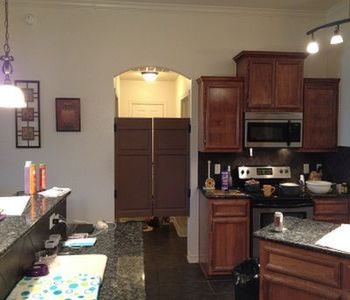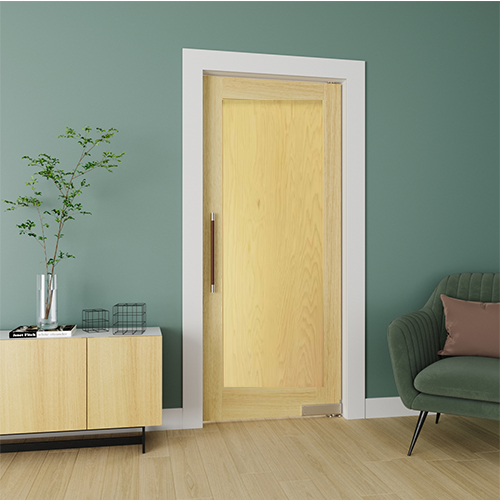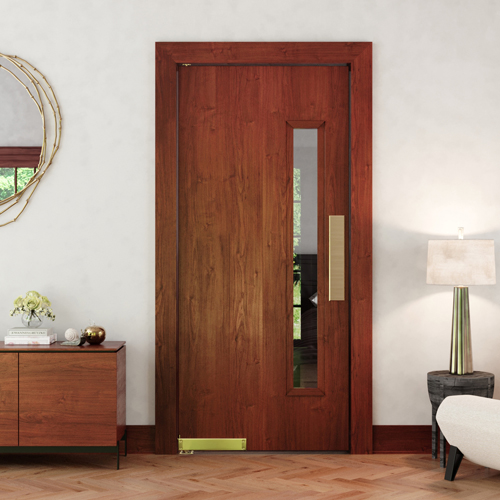
Solid Wood Doors vs. Louvered Wood Doors: A Comprehensive Comparison
Solid Wood Doors vs. Louvered Wood Doors: A Comprehensive Comparison

The aesthetic of your home is more than just the color of your walls or the style of your furniture. It’s in the details, and one significant detail that often goes unnoticed – yet is essential to the overall ambiance – is your choice of doors. Whether to go solid or louvered in the realm of wood can be a tough decision, as each type offers its benefits and drawbacks. This comprehensive comparison is designed to help you navigate this decision confidently, ensuring that the doors you choose look great and serve their function exceptionally.
Solid Wood Doors: Tradition Meets Durability
Solid wood doors have stood the test of time, known for their sturdiness and classic appeal. Crafted from various hardwoods, these doors enhance the aesthetic of any room with their natural beauty and timeless elegance.
Advantages of Solid Wood Doors
Durability
Solid wood is renowned for its prolonged life. It's resistant to wear and tear, meaning a well-maintained solid wood door can last a lifetime.
Insulation
Solid wood doors provide excellent insulation, keeping your home warm in winter and cool in summer. The dense wood reduces heat exchange, significantly impacting energy bills and overall comfort.
Aesthetics
There's no authentic substitute for the warmth and character of real wood. Solid wood doors are a design statement, adding a touch of luxury and architectural integrity that many find irresistible.
Disadvantages of Solid Wood Doors
Cost
The initial investment in solid wood doors is higher than many other door materials. If cost is a critical factor for you, this may be a downside.
Maintenance
Solid wood doors require periodic maintenance to keep them looking their best. This includes regular painting or sealing to protect against moisture and to prevent the wood from warping or rotting.
Louvered Wood Doors: Style and Functionality in One

Louvered wood doors offer a unique blend of style and functionality. Comprising wood slats or louvers, this type of door allows for the circulation of air while still maintaining a level of privacy.
Advantages of Louvered Wood Doors
Ventilation
For rooms that require air circulation, such as a laundry room or a pantry, louvered doors provide an excellent solution. They allow air to flow freely, preventing stale air from accumulating.
Privacy
Despite their ventilation capabilities, louvered doors still offer some privacy. The angled slats make it difficult to see through the door, maintaining modesty while allowing for airflow and light.
Style
Louvered doors provide a clean and modern look that can complement various design styles – from coastal to minimalist. They are prevalent in spaces where an open or airy feel is desired.
Disadvantages of Louvered Wood Doors
Limited Insulation
Compared to solid wood doors, louvered doors offer less insulation. While they regulate airflow effectively, they may not be the best choice for areas that require strict temperature control.
Maintenance
Louvered doors' slats can accumulate dust and require regular cleaning to maintain their functionality and appearance. This added cleaning time should be a consideration when choosing these doors.
Cost
Although typically less expensive than solid wood doors, louvered wood doors can still be a higher investment than some other door materials. It's essential to consider the upfront and long-term costs.
Key Factors to Consider in the Comparison

When comparing solid wood and louvered wood doors, several key factors should influence your decision-making process. These include:
Functionality
Consider the specific function of the door and what you expect from it. Are you prioritizing air circulation or temperature control? Will the door be used frequently or be more decorative?
Style and Aesthetics
Do the doors fit with your interior design vision? Solid wood may offer a more traditional look, while louvered doors are often synonymous with a contemporary aesthetic.
Cost
Your budget will play a significant role in the decision, as both initial costs and long-term expenses should be weighed. Consider the cost of installation, maintenance, and potential energy savings.
Maintenance
How much time and effort are you willing to put into preserving your doors? Solid wood doors require more upkeep than louvered doors, needing periodic refinishes.
Durability
How long do you want your doors to last, and what level of wear and tear do you expect them to withstand? This depends on the quality of materials and craftsmanship.
Which Door Is the Right Fit for You?

In the end, there isn’t a one-size-fits-all answer to the solid wood vs. louvered wood door debate. It ultimately comes down to your specific needs, preferences, and the aspects of your home that are most important to you. If you’re looking for unrivaled durability and insulation, solid wood doors are the clear choice. On the other hand, if ventilation and style are your priorities, louvered wood doors might be the best solution.
Consider consulting with a home design professional or a door specialist to explore all options fully. They can help you envision the final result and ensure that the doors you select seamlessly integrate into your home. Remember, whatever choice you make, the right doors will provide functionality and beauty for years to come.
In crafting the perfect home, every detail matters, and the doors you choose are no exception. Let this comparison guide you toward making an informed decision that aligns with your lifestyle and the vision you have for your living space. The choice between solid wood and louvered wood doors is a significant one, but with the right considerations, you can be confident in your selection.
